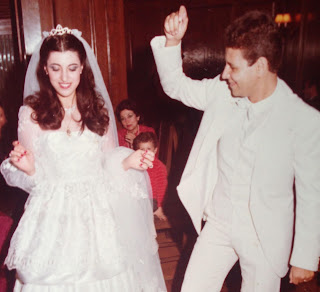Blows against the empire | But Check Out What Adaweya Is Doing (1975)
Their applause and exhortations are so aggressive you wonder if it's not meant for Ahmed but for his haters. This feels more like a sporting event than an hour of music. Before the first track officially kicks in, there's a rousing all-woman chorus sing-cheerleading the album's title: "Bis! Shouf! Adaweya Amil 'Iyh! Bis! Shouf! Adaweya Amil 'Iyh!"
The word "album" in regard to recordings dates back to the 78 RPM shellac era, when it meant literally a number of single 78s collected together in a physical album, similar to a photo album. For people of my generation in America, it meant long-playing, 12" 33-1/3 RPM vinyl records, generally, though it could also mean an implied cohesiveness or unifying concept, the live album, for instance, or the experience, for want of a better word, of Pink Floyd's Wish You Were Here.
In 1970s Egypt, most 12" LPs were simply collections of songs, many earlier released on singles; however, increasingly, the format was exploited for long-form (mostly live) performances. Ahmed's But Check Out What Adaweya Is Doing, released the same year as Wish You Were Here, is, I'm going to argue, no less of a conceptual middle finger to the local music industry than the Floyd's celebrated slow burn.
As numerous scholars and historians have documented, Ahmed's swift rise to fame in the early 1970s was met with significant resistance by gatekeepers of all kinds, including state-controlled radio, and cassette recordings, in particular, were targeted as part of a broader concept of "vulgar media."
As Andrew Simon notes, "Adawiya and his peers harnessed audiotapes, first and foremost, because Egyptian radio refused to broadcast what its officials deemed 'vulgar' material. Forced to find another way to be heard, Adawiya used tapes as a tool to reach a mass audience and make his name known outside of weddings and Cairo's backstreets."
That pose is the dictionary definition of an uber-confident "Check me out, why don't you?"
Then we get the experience of listening to the album itself. Prepare yourself. It kicks ass. It is NOT a series of discreet, mostly previously published tracks. It's an event. The first sound you hear is not an instrument, but a very small, extremely boisterous audience.
On closer listening, this is likely not an audience but the musicians and tech crew in the studio, super-amped up, ready to fucking lay this shit down. Their applause and exhortations are so aggressive you wonder if it's not meant for Ahmed but for his haters. This feels more like a sporting event than an hour of music. Before the first track officially kicks in, there's a rousing all-woman chorus sing-cheerleading the album's title: "Bis! Shouf! Adaweya Amil 'Iyh! Bis! Shouf! Adaweya Amil 'Iyh!"
Hassan Abu Itam writes the lyrics for all tracks; the composers include, in order of appearance, Mohamed Taha ("Ya Khatiy Asmalatayn"), the great Baligh Hamdi, ("Beng Beng"), accordionist Hassan Abu El Seoud ("Balash El Loun Da Maana"), and Mohamed Asfour ("Fizadaq Mumalah").
I haven't been able to identify credits for the fifth and final track, "Mawawil Folklore"; it may simply be "trad." It is nearly 17 minutes of the most incredible singing and playing anyone has ever captured, including the "audience" interjections, which no longer, here, have that aggressive feel -- Ahmed has whipped everyone into a frenzied trance.
The overall album vibe is closer to Nigerian Geraldo Pino's 1972 Afro Soco Soul Live than anything I've heard in Arabic from the seventies. It's a stone cold classic.
Here's Side A
(Listen to "Ya Khatiy Asmalatayn")
(Listen to "Beng Beng")
(Listen to "Balash El Loun Da Maana")
Here's Side B
(Listen to "Fizadaq Mumalah")
(Listen to "Mawawil Folklore")







Comments
Post a Comment